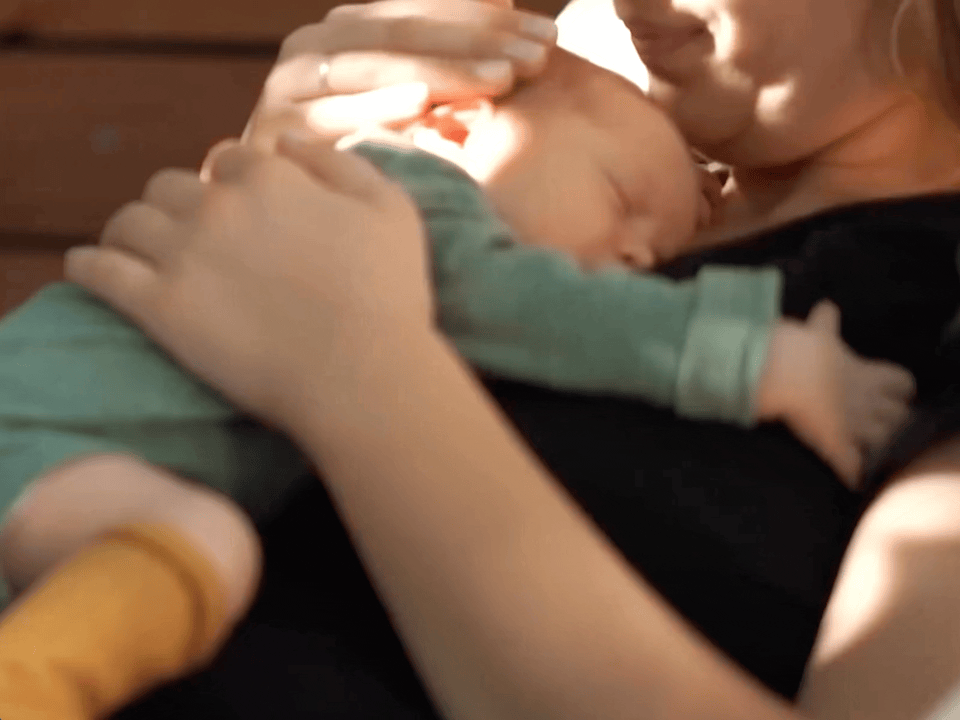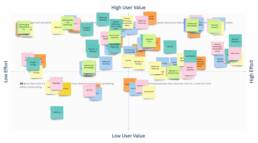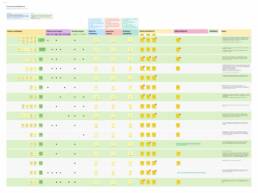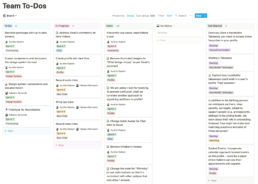Over the past eight weeks, my team and I here at MetaLab partnered with Koble, a Toronto-based startup that is shaking up the parenting and health tech industries with the launch of its digital platform. Koble’s purpose is to improve the health, happiness, and confidence of all parents by offering accessible and affordable support to families, globally. The healthcare system mainly focuses on the birthing experience, and additional services to support parents through postpartum and beyond are unaffordable for most. Growing a family is emotionally, physically, and financially demanding, and the support available today is missing the mark, risking the health and well-being of millions of people yearly. With the rising number of new parents feeling lonely and the skyrocketing rates of postpartum depression due to the impact of the pandemic, the startup is seeing the need for a shift in consumer health solutions. Koble is paving the way for a new paradigm of parenting care — an aggregated health solution that supports their emotional, physical, and mental well-being through their parenting journey from the first trimester to the child’s first birthday.
New challenges that require unique solutions
A Facebook IQ– commissioned study [1] showed that 39% of new parents surveyed in the US take part in an online group to find emotional support and advice from their fellow parent communities. Conveniently accessible on mobile and available 24/7, online groups offer an easy way to answer pressing questions at any hour. The problem with these parenting groups is that members share their personal life experiences without oversight from experts on various topics, potentially spreading misinformation that can cause danger or harm. Multiply this at the scale of Facebook’s billions of users and across all subject matters, and it’s easy to understand how the spread of misinformation can be so damaging.
The COVID-19 pandemic has also posed new threats to families through social isolation due to physical distancing measures, school and child care closures, financial and employment insecurity, housing instability, and changes to health and social care access. [2–4] These shifts have profoundly interrupted the systems and structures that previously supported families’ mental health and well-being and mitigated health and social inequities. Every day comes with many new challenges and — unlike any other life event — leaves families unaware, untreated, and isolated; the support available is insufficient and disjointed.
A few months after Koble launched their initial beta, they learned that their users were finding lots of value in connecting to experts but were craving community, learning, and connecting with parents at the same stage as them. Therefore, they reached out to MetaLab to help them create a new model for community vs. care, improve user acquisition, and drive engagement. This fantastic opportunity to build a product for social good leads us to one critical question: How might we create a community learning model that provides informal knowledge from peer parents and formal insights from verified experts while maintaining a safe psychological space?
The roadmap: an eight-week rollercoaster ride
One major challenge was our short-term roadmap for bringing the vision and strategy to life. At MetaLab — where most of our projects usually run for a minimum of 12 weeks — we typically follow several steps:
Can key deliverables and features ever be well defined in eight weeks? Can Koble’s product vision be delivered in such a short time? We started this journey with two intense days of Kickoff meetings to better understand their concerns, what success would look like, how we could communicate, and how to work together to build a cohesive product experience.
Prioritize high-value community features
That led us to a prioritization matrix exercise to identify the features customers would value most. Keeping our core persona at the forefront, we considered complexity, risk, effort, and any other combination of factors around each community feature during this stage.
However, that framework didn’t have enough specificity to align with the scope. Therefore, we created a new feature-ranking activity to help us view the product through the lens of Koble’s business model to get more clarity around the value for customers and long-term revenue.
When prioritizing efforts within a project, you must make the same decision hundreds of times: Is this necessary to do now? The right way to approach this is to develop a practical mindset to decide quickly what is absolutely necessary. To rank the features we should build in eight weeks, we estimated various data points:
– Feature area impacts and dependencies between user stories
– Persona impacts
– Value for customers: Is it a cosmetic improvement? Does it make a frequent task more comfortable to achieve? Does it help with a secondary task or a primary task?
– Long-term revenue
– Technical complexity
– The time it will take to finish the project
We explored many patterns that could provide value and meet users’ expectations around some key features: community matching, Q&A and recommendations, expert-led roundtables, member-to-member chat, user-generated content, referral, creator tools, reactions to content, community safety, follow/notification, feedback tools, member expertise, gamification, journal, and profile settings.
Nonetheless, with 28 days of design, start to end, we rallied for scope consensus to ensure we could finish the project according to the pre-defined time and budget. Thus, our focus area included only private cohort groups we call “Nests”, involving community-matching and chat, and expert-led roundtables to help parents with support, communication, and learning. This consensus helped all team members be on the same page about all the factors and restrictions regarding the project.
Working across time zones
Another challenge was working remotely with a distributed team across time zones from Europe (Paris, Lyon, London) and Canada (Vancouver and Toronto). Determining a good time for a work meeting with teammates, specifically while changing hours, is a constant battle full of compromises. Our team inevitably experienced delayed responses and difficulty scheduling, between waking up early in the PST zone or having late meetings in the GMT zone. That led to over-communication from day one, with daily Loom syncs, asynchronous activities, and multiple team sync to feel connected daily. To set the right balance between synchronous communication and keep track of each designer’s progress, we used a Weekly Story Tracker.
Create an environment that nurtures psychological safety
To translate our ideas into something more tangible, we scribbled down a list of interactions and principles around private cohort nests and roundtables. That allowed us to identify critical questions around the foundations of Koble’s community:
How might we help parents foster connection?
Becoming a parent is a beautiful experience, but it comes with physical and emotional challenges. By attending private support groups, parents can develop and strengthen relationships amongst their family members and peers, improving social well-being and the overall health of themselves and their babies.
How might we help parents foster connection?
Becoming a parent is a beautiful experience, but it comes with physical and emotional challenges. By attending private support groups, parents can develop and strengthen relationships amongst their family members and peers, improving social well-being and the overall health of themselves and their babies.
75% of new parents experience a shift in their emotional health, and 15% will develop long-lasting depression. This has worsened due to the pandemic.
Cleveland Clinic, 2018, Postpartum Depression.
To create personalized matches, users answer psychographic questions to complete their profiles and define common/opposite points with other users and groups based on personality, lifestyle, interests, parenting style, and social status.
How might we make Koble’s community a safe space where people are open to sharing and growing, regardless of who is part of the community?
When people feel psychologically safe, they’re more likely to share information, seek feedback, ask for help, and talk openly about mistakes. All of these things lead to faster learning and help teams and individuals surface challenges and perform more effectively. A lack of psychological safety, in contrast, can make it hard for people to speak up and surface ideas or challenges.
Conflict within online communities can have many causes, including miscommunication, criticism, conflicting opinions, technical mishaps, moderation problems, and cultural differences. A safe environment is inclusive. Creating areas that enable people to feel they are gaining a community and home is perhaps a fundamental way to help people thrive. That means members should agree and share the community’s core values of acceptance and respect.
Some users are more susceptible than others to being targeted by harassers. Allowing users to block or restrict other people from seeing their content or interacting with them can help protect users from unwanted communication. Therefore, we allowed users to make their profile accounts partially private outside of their nests, post content, chat, and attend roundtables anonymously.
Letting users choose who can see their content allows them to maintain privacy if they are being harassed or want to mitigate the chances that harassers will find and target them. Helping users feel like their reports have been genuinely considered can increase their confidence in becoming long-term users. Koble’s moderators can verify the reported content before deciding whether it’s safe or must be removed. This reporting option can also help Koble reduce the impact of misinformation and harassment on the platform. Finally, members can contribute to media accessibility by choosing their communication style: text, audio, or video.
How might parents learn and grow together?
Users rarely come to online communities to look for formal insights. Community members share successful and unsuccessful experiences to deepen collective knowledge inside intimate cohorts. The Koble-bot and moderators prompt users to encourage weekly check-ins, time-sensitive milestones, information, and group prompts.

Hack the design process
With an established acquisition funnel through onboarding, we needed to be mindful of Koble’s existing app architecture and design system to ensure that the experience we build would be consistent and integrate seamlessly into theirs. This encouraged us to avoid mismanaged expectations that could hurt the scope down the line and to investigate other solutions to current end-user pain points in the community experience. Thus we hacked our design process for quick iteration in a tight timeline.
We opted for one Crazy 8’s per-flow for each feature during one week to overview the information architecture. This is what we called the “Foundation” phase of the project, where we focused on understanding the requirements for Nests and Roundtables.
We defined different features’ stages and interactions to understand their mechanics, which gradually changed depending on users’ needs. Then we separated our feature ideas into two buckets: must-haves and nice-to-haves. That way, we could create a lean first version of Koble’s community. That not only kept us from taking on too much but also sped up the design process.
Then we began understanding content types and how the flows would work. We transformed our rough sketches into low-fi prototypes to identify critical interactions and fill any gaps that came up. Finally, we switched to high fidelity and built our components and new elements of the design system.
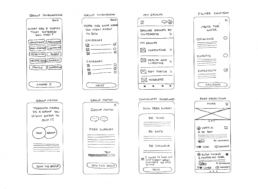
Challenge our biggest hypothesis
We surveyed a group of 22 parents to verify our biggest hypothesis around matching factors, group chat communication, and anonymity. We discovered that the top 3 commonalities for parents to connect with peers are personality (90.9%), lifestyle (86.4%), and parenting style, followed by openness to share (77.3%). These figures challenged our beliefs about parents’ social status (e.g., education level, employment status, religion, and marital status) as relevant for parental compatibility.
When asked about how parents typically prefer to communicate in group chats, 100% of respondents selected text chat, while video was selected second by 18.2% of respondents, and audio (e.g., audio chat, voice notes, audio call, etc.) with 0%.
During a roundtable, the decision by some participants to be anonymous can make others feel less comfortable sharing sensitive or private information. Some parents thought that it should either be an open space using your real identity or that everyone should be anonymous. Having both options introduces vulnerability and a lack of equilibrium. When it comes to sharing private information, people want to know who they’re speaking to. Anonymity could impact comfort, depending on the data shared, and lead to a less trusting environment.
Wrapping up
Creating a parent community model that provides psychological safety in eight weeks challenged our design process and led us to shift our mindset. Even with a few respondents, we’ve gathered valuable insights that signal a direction for Koble to introduce an inclusive and intimate community experience. We also learned some valuable lessons during this project:
– Personality types and parental styles are high-value factors for parent compatibility.
– We can manage media accessibility by giving users the choice of their communication type.
– Capitalizing on new approaches to data requires a practical mindset.
In keeping with the lessons learned during this project, at the core of most successful organizations are people who work well together. Our partnership with Koble has been a fantastic ride that we can’t wait to continue in the future.
Sources
[1] Facebook-commissioned survey of 1,620 expecting or new parents ages 18 and older in the US and interviews with 10 expecting or new parent couples in the US, July 2017.
[2] Coller RJ, Webber S. COVID-19 and the well-being of children and families. Pediatrics 2020;146:e2020022079. doi:10.1542/peds.2020–022079 pmid: http://www.ncbi.nlm.nih.gov/pubmed/32873717 FREE Full Text Google Scholar
[3] Gassman-Pines A, Ananat EO, Fitz-Henley J. COVID-19, and parent-child psychological well-being. Pediatrics 2020;146:e2020007294. doi:10.1542/peds.2020007294 pmid: http://www.ncbi.nlm.nih.gov/pubmed/32764151 Abstract/FREE Full-Text Google Scholar
[4] Canadian Human Rights Commission. Statement — Inequality amplified by COVID-19 crisis, 2020. Google Scholar
Thanks to Swati Matta, Muriel Haldenby, Althea Wishloff, Fabiano Bernardo, Shiera Aryev, Piergiorgio Gonni, Emma Harris, and Melanie Arras for making this happen.
This article has been first published on UX Collective.

Aurélie Radom
I'm a Lead UX/Product Designer with 10+ years of experience in service design. I love designing meaningful experiences that can change people's lives positively.
